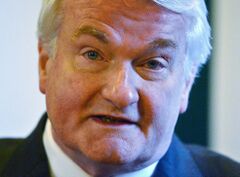Ian Burnett
(Judge) | |
|---|---|
 | |
| Born | Ian Duncan Burnett 28 February 1958 |
| Alma mater | Pembroke College (Oxford) |
Ian Burnett, Baron Burnett of Maldon, is a British judge and the current Lord Chief Justice of England and Wales.[1]
Legal career
Ian Burnett was called to the bar at Middle Temple in 1980, and became a bencher there in 2001. From 1982, he practised at Temple Garden Chambers, serving as head of chambers from 2003. He was made a QC in 1998. He practised mainly in public and administrative law, acting on the inquiry into the 1987 Kings Cross fire, the inquiry into the convictions of the Guildford Four and Maguire Seven, the inquiries after the 1997 Southall rail crash and the 1999 Ladbroke Grove rail crash, and the inquests after the 1997 deaths of Diana, Princess of Wales, and Dodi Fayed.
Burnett served as an Assistant Recorder from 1998 to 2000, and then as a Recorder until 2008. He also served as a deputy Judge of the High Court from 2008. He was appointed as a Judge of the High Court in 2008, in the Queen's Bench Division. Burnett was knighted on 7 November 2008. He sat in the Administrative Court and was presiding Judge of the Western Circuit 2011–14. He was promoted to the Court of Appeal in 2014, becoming a Lord Justice of Appeal.
It was announced in July 2017 that Sir Ian Burnett would replace Lord Thomas of Cwmgiedd as Lord Chief Justice of England and Wales from 2 October 2017.
Aged 59, Lord Burnett became the youngest Lord Chief Justice since Lord Parker of Waddington in 1958.
Ennoblement
On 12 October 2017, it was announced that Sir Ian Burnett would be awarded a life peerage and was created Baron Burnett of Maldon, of Maldon in the County of Essex, on 30 October 2017.[2]
Political interference
Speaking at his annual press conference on Tuesday, 1 December 2020, Lord Burnett warned of unprecedented levels of political interference over the work of courts in England and Wales, suggesting that MPs should be taught about “boundaries”.
“There has been nothing quite like it in my experience,” he added.
“There needs to be sensitivity displayed by all branches of the constitution - so that is the legislature, the executive and the judiciary as to the proper sphere of the others.
“I am pretty confident that judges understand where the boundaries lie, but I am less confident at the moment that all parliamentarians have an instinctive understanding of where those boundaries lie.”
His comments came a day after the Attorney General, Suella Braverman, took the rare step of personally calling for the Court of Appeal to increase the prison sentences given to three teenagers who killed a police officer.
The Lord Chief Justice has publicly spoken out against comments by Boris Johnson and Priti Patel on immigration lawyers, after a backlash against Home Office material on “activist” solicitors representing asylum seekers. He said lawyers should “not be subject to criticism for doing their job” by representing clients.
“The vitality and independence of the legal profession is an essential hallmark of a society governed by the rule of law,” he added. “A general attack on the legal profession, in my view, undermines the rule of law.”
Lord Burnett also called for the government to ensure that the justice system is properly funded to deal with case backlogs that have mounted during the coronavirus pandemic. He said that courts were currently subject to financial constraints despite being “demand-led”, contrasting their position with other public services:
“The longer the gap between the reporting of an offence and its eventual trial, the more likely it is that something will go wrong. It can be as simple as important witnesses losing interest, for example, in continuing to pursue the case.”[3]
Related Documents
| Title | Type | Publication date | Author(s) | Description |
|---|---|---|---|---|
| Document:Assange Judge is 40-year "good friend" of Minister who orchestrated his arrest | Article | 2 December 2021 | Mark Curtis Matt Kennard | Julian Assange’s fate lies in the hands of an Appeal Judge who is a close friend of Sir Alan Duncan - the former Foreign Office minister who called Assange a “miserable little worm” in Parliament |
| Document:Assange ruling a dangerous precedent for journalists and British justice | Article | 10 December 2021 | Jonathan Cook | And yet despite all this, the English High Court ruled on 10 December 2021 that it was satisfied with “assurances” that Assange’s wellbeing would be protected were he extradited to the United States. British judges may be persuaded by those assurances. Many others, including Assange, will not be. |
References
Wikipedia is not affiliated with Wikispooks. Original page source here